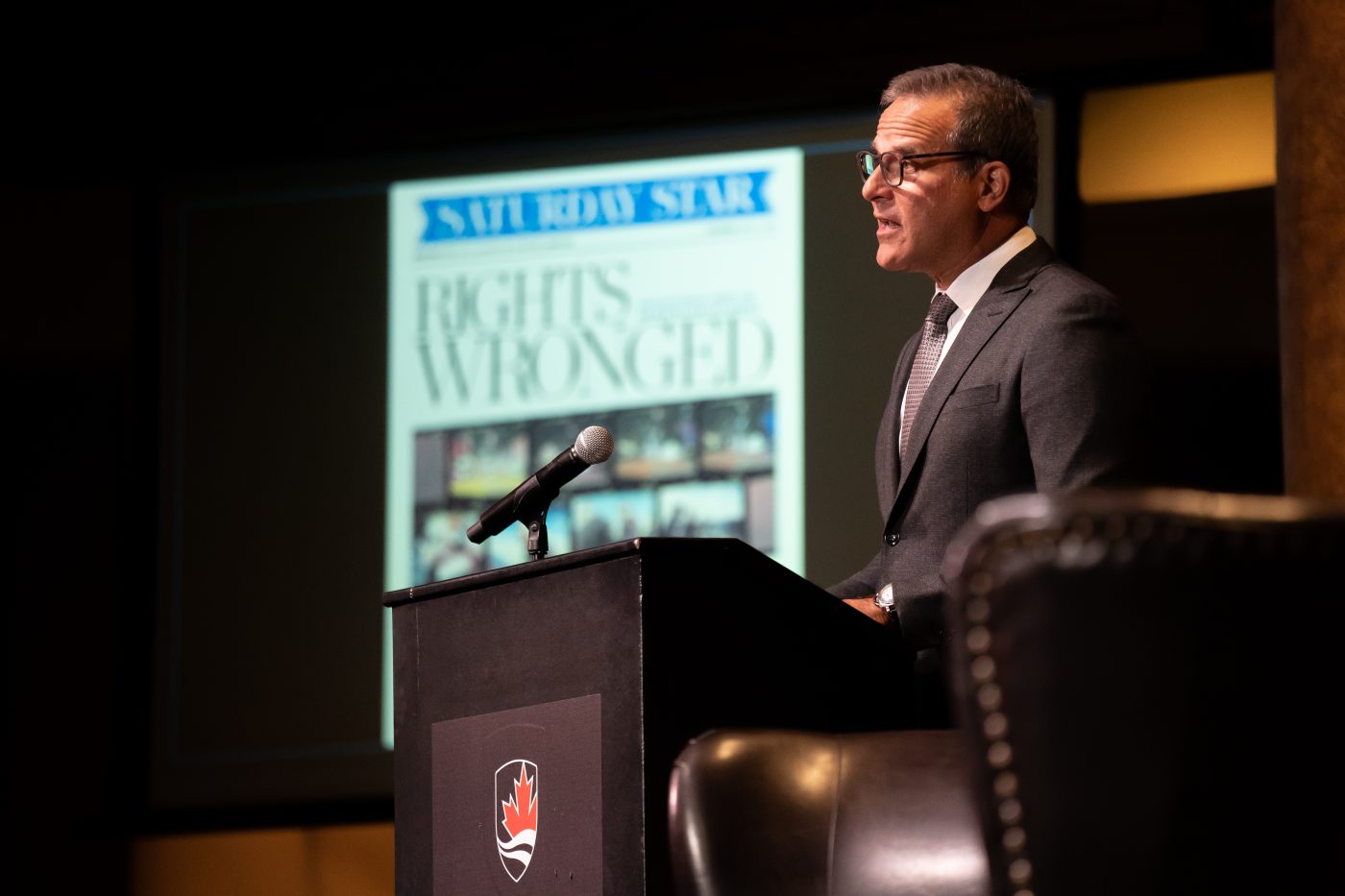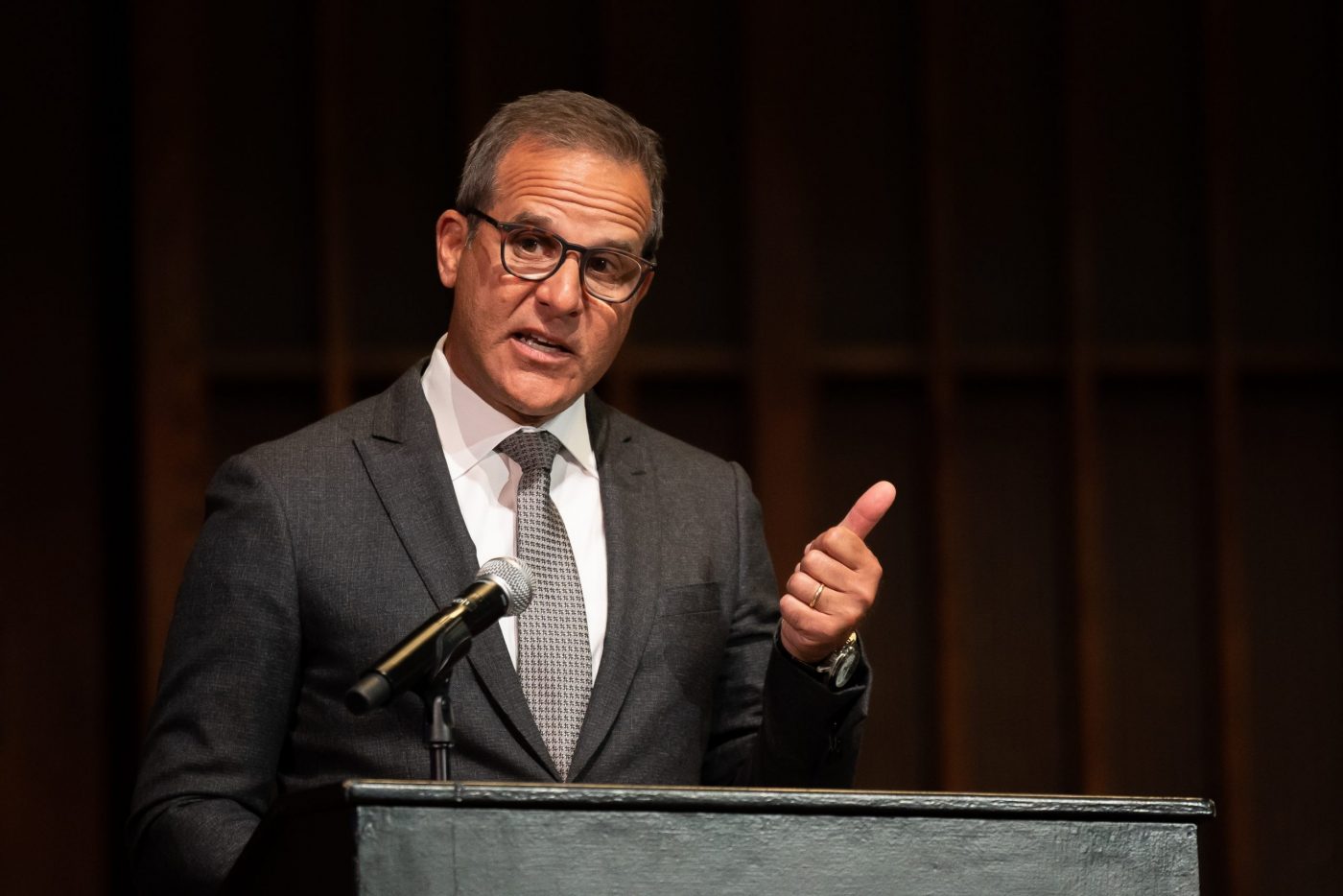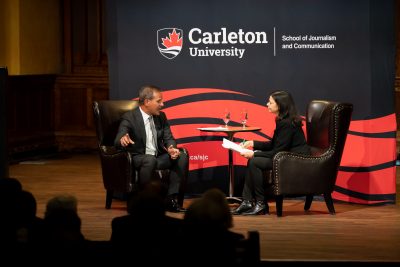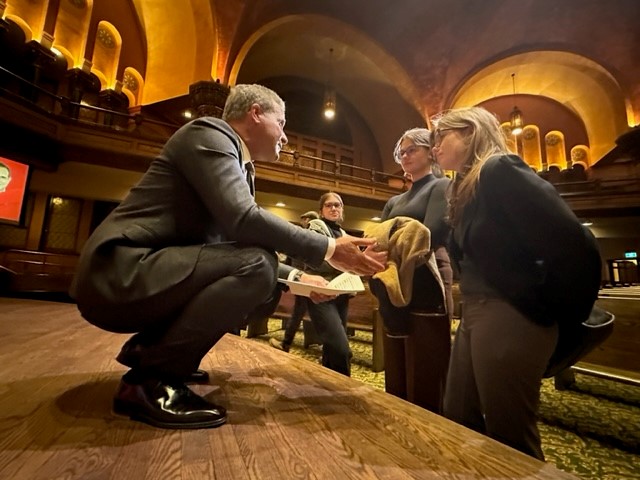Toronto Star owner Jordan Bitove used the 2023 Kesterton Lecture hosted by Carleton University’s School of Journalism and Communication to make an emotional plea for support for local journalism that is a cornerstone of our democracy.
Bitove took direct aim at big tech companies like Google and Meta that are draining away digital ad dollars from traditional media outlets like The Star while profiting from the news content The Star and others produce.
He also challenged the Canadian government to make a conscious effort to use some of its massive ad budget to better support Canadian news organizations instead of just spending a pittance on traditional ads.
“We’re here today because we’ve posed the question – Imagine a world without journalism,” Bitove began. “A few years ago, that might’ve sounded melodramatic. But there are real alarm bells now – and we better be paying attention.”

Close to 300 people registered to attend the lecture in person at the Carleton Dominion-Chalmers Centre and another 150 registered to participate via Zoom.
The annual event is held to honour the memory of Wilfred Kesterton – one of Carleton’s original journalism professors – with an annual talk that touches on some aspect of Canadian journalism.
Off the top, Bitove acknowledged that he is NOT a journalist and that his closest connection to the news industry before buying The Star was being a paper boy as a kid.
But in the next breath, he said he’s determined to use his business acumen to make The Star succeed, a theme he repeated throughout the evening. Indeed, he became visibly emotional when talking about the “public trust” that comes with owning such an important media outlet as The Star.
His voice cracking with emotion, Bitove spoke about the relationship he formed with the late John Honderich, who headed the family trust that long controlled The Star before ownership was passed to Bitove.
“I reached out to John Honderich, then chair of Torstar – with a proposal for the media company. I was honoured and frankly a little surprised, that he agreed to meet with me,” Bitove said.
He said The Star’s main challenge in terms of its business operations was its digital transformation in the inevitable shift away from printing newspapers to reaching audiences on digital platforms.
But Bitove said the key external challenge for media organizations like The Star is that advertising revenue has cratered because the overwhelming bulk of ad dollars are now soaked up by content providers such as Google, Meta and Twitter. The big tech firms are swallowing more than 80 per cent of digital ad spending and Bitove said that money has been drained from companies like The Star and is also leaving the country.
“The advertising revenue that once funded our newsrooms has been moved – ironically to companies that use our content for their benefit,” he said. “Oh – and those companies don’t want to pay us for it. The result is that we are seeing local news disappear.”
Bitove recited a litany of closures of news organizations across the country and thousands of job losses in the news sector.
“Over 3000 editorial and non-editorial news jobs lost since 2020,’’ he lamented. “More if we count recent layoffs. What it means, is that we have some significant gaps in local information and accountability.”
He pointed to Ottawa as an example of a media market that should have thriving news organizations serving the public in the nation’s capital.
“Ottawa is not a news desert. But what’s happening here is a clarion call. We should be concerned when a market of this size – and our nation’s capital – risks losing local context. Fewer reporters, means fewer stories and tighter coverage.”
He pointed to the fact that the Ottawa Citizen, which had close to 200 editorial employees in the newsroom a couple of decades ago now has little more than a couple of dozen.

“The empty seats designated for reporters at city hall, in Parliament and local courts are not going to be filled by message boards and isolated interest groups,” he said.
“Fact-checked, investigated, accountable truths – the stories that inform civil discourse, how we vote, what is happening in schools, hospitals, in the offices of influence, and on our streets – this comes from journalists – real people putting in a ton of effort to keep citizens informed.”
Bitove noted that he appreciated the support the federal government has provided for the journalism industry. But he said there was still a major piece missing.
“Where is the support for local media? When governments and businesses espouse to support communities, why is local news not part of that?
When climate change, health care, reconciliation, equity, diversity and inclusion are priorities, how can Canadian media be overlooked?
People have never had more options and interest in news, yet the revenue to support trusted outlets has never been lower. This needs to change,” he said.
 By way of example, he pointed to the $140 million the federal government typically spends in a year through ads to reach Canadians on topics like COVID, reconciliation, equality, climate change, affordability, health care, and many other important issues.
By way of example, he pointed to the $140 million the federal government typically spends in a year through ads to reach Canadians on topics like COVID, reconciliation, equality, climate change, affordability, health care, and many other important issues.
But The Star and other traditional media outlets get only a tiny fraction of those ad dollars.
Bitove also appealed to ordinary Canadians to do more to spend money on what he called “the ethical media supply chain” by taking out subscriptions themselves and leaning on others to do so.
“Find out what the organizations you are a part of – and the companies you deal – with allocate their advertising dollars. Ask what percentage of their media spend goes to supporting Canadian-owned and operated media.
“If it’s not 20 per cent, it’s not enough. Whether it’s Torstar, the Citizen or CP24, trusted local news delivers the audiences they want, and we are ready to partner with marketers to deliver.”
And he encouraged journalism students to ask their friends and their professors
if they have a paid subscription to Canadian news “and if not, why not?”
To that end, Jordan held out an offer of free, three-month trial subscriptions to The Star for every journalism student at Carleton and to all those who attended the Kesterton Lecture.
The event was moderated by Nahlah Ayed, host of CBC Radio’s Ideas, and also a proud Carleton grad. After the keynote, Ayed held an onstage discussion with Bitove, then opened the floor to questions.
During the question period, Bitove elaborated on his personal commitment to do whatever it takes to make The Toronto Star succeed and he said he considers himself to be “the custodian” of that public trust.

Wednesday, March 29, 2023 in Journalism News, News
Share: Twitter, Facebook



